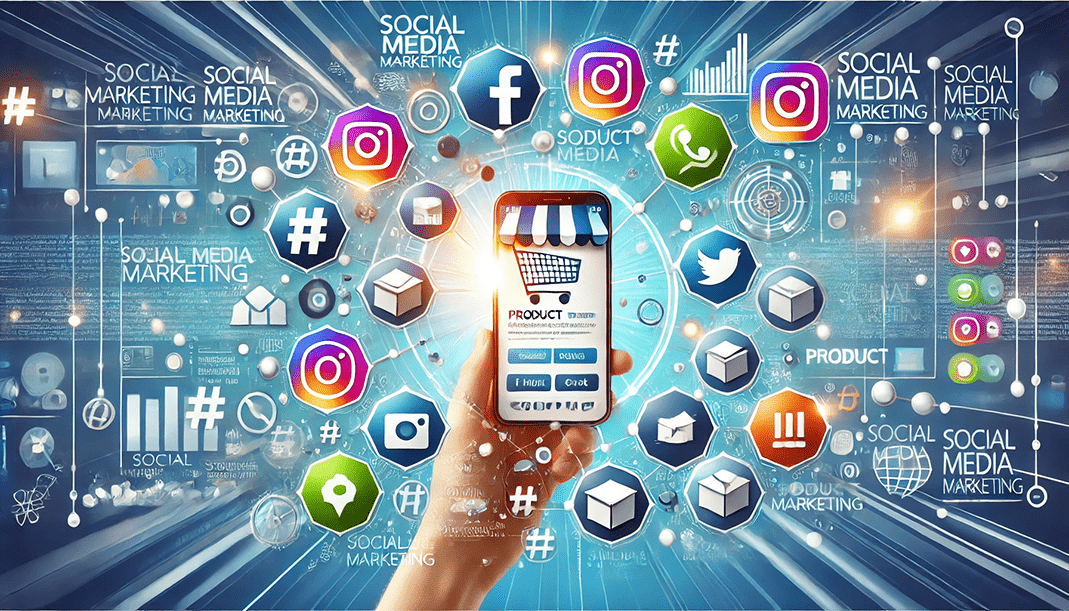
______________________________
Marketing your products or services using social media can significantly increase traffic to your website and improve overall conversions. The key to success is linking directly to specific pages on your website and strategically using hashtags to reach a targeted audience. Let’s break down how to optimize your social media marketing for individual products or service pages.
1. Direct Linking to Specific Service or Product Pages
One of the most common mistakes businesses make is linking to their homepage instead of the specific product or service page they are promoting. Users who are interested in a particular product or service want to access that information quickly. By linking directly to the corresponding page, you reduce friction in the buying process, increase user engagement, and enhance the likelihood of conversion.
Best Practices:
Post Example for Products: If you're promoting a new product, such as a ceramic mug, link directly to that product page instead of a general shop page. This makes it easier for potential buyers to add the product to their cart.
Post Example for Services: If you're marketing a specific service, such as "24/7 Emergency Plumbing Services," link directly to that service page rather than a generic services overview.
Ensure Mobile Optimization: Always test your product or service pages on mobile devices to ensure that users have a seamless experience after clicking through from social media.
2. Using Hashtags to Target the Right Audience
Hashtags play an essential role in expanding your social media reach. When used strategically, hashtags allow your content to be discovered by users who are searching for relevant topics, industries, or products.
General Hashtag Strategy:
Brand-Specific Hashtags: Create and use a unique hashtag for your brand to build recognition. For example, if your brand is XYZ Plumbing, use #XYZPlumbing in all relevant posts.
Industry-Related Hashtags: Use hashtags that are popular in your industry. For a beauty brand, hashtags like #BeautyTips, #SkincareRoutine, or #MakeupHacks might perform well.
Location-Based Hashtags: If you're targeting a local audience, use geo-specific hashtags like #BuffaloNY or #MiamiBusiness to attract customers from your area.
Trending and Niche Hashtags: Keep an eye on trending hashtags and use them when appropriate to increase visibility. You can also include niche hashtags to target a smaller but highly engaged audience.
Tailoring Hashtags for Products and Services:
Product Hashtags: If you're promoting a new line of eco-friendly water bottles, your hashtags should focus on your product and audience. Examples: #EcoFriendlyBottles, #SustainableLiving, #ZeroWasteLifestyle.
Service Hashtags: If you're promoting home renovation services, incorporate both service-based and benefit-driven hashtags. Examples: #HomeRenovation, #KitchenRemodel, #IncreaseHomeValue.

______________________________
3. Create Platform-Specific Strategies
Each social media platform functions differently, so it's crucial to tailor your approach depending on the platform you're using.
Instagram:
Instagram thrives on visual content, so make sure you have high-quality images or videos of your products or services. Use the 30 hashtag limit wisely by mixing popular, niche, and branded hashtags.
- Product Example Post:
- Caption: "Check out our new eco-friendly water bottle, designed to keep your drinks cold for hours! 🌿 #EcoFriendlyBottles #SustainableLiving #WaterBottleLove"
- Include a direct link to your product page in your bio, and mention "Link in bio" in your post caption.
Twitter:
Twitter has a faster-paced feed, so you need to capture attention quickly with concise posts and fewer hashtags. Use 2-3 well-chosen hashtags per tweet and always include a direct link to your product or service page.
- Service Example Tweet:
- "Our 24/7 Emergency Plumbing Services are just one call away! Don’t wait for a disaster, get help now: [link] #EmergencyPlumbing #HomeRepairs #PlumbingNY"
Facebook:
Facebook allows more room for long-form content, so take advantage of this by explaining the benefits of your product or service in detail. Use fewer hashtags (2-3) and make sure your post is engaging.
- Example Post for Service:
- "Is your kitchen in need of a makeover? Our expert remodeling services can bring your dream kitchen to life. Learn more about our kitchen renovation packages: [link] #KitchenRemodel #HomeImprovement #BuffaloNY"
LinkedIn:
LinkedIn is best suited for B2B services and professional audiences. Keep the tone more formal, and focus on how your products or services add value to businesses or professionals.
- Example LinkedIn Post:
- "Does your office need a technology upgrade? We specialize in providing state-of-the-art IT solutions to keep your team running smoothly. Discover our services: [link] #BusinessSolutions #TechUpgrade #LinkedInBusiness"
4. Utilize Stories and Reels for Direct Engagement
Social media platforms like Instagram and Facebook offer Stories and Reels, which provide an excellent opportunity for promoting your products and services in a fun, engaging way. Use these formats to showcase behind-the-scenes content, product tutorials, or client testimonials, and always include a direct link to your product or service page through the swipe-up feature (or a sticker if eligible).
- Example for Stories:
- Post a short tutorial video showing how easy it is to use one of your products, with a direct link to the product page. Use hashtags in the story for extra discoverability.
5. Cross-Promote Across Platforms
Promote your product or service consistently across all platforms, but tailor each post for that platform's audience. Always ensure that each post links to the relevant page of your website to maximize conversions. You can even encourage your audience to share your content by offering incentives like discounts or giveaways, which can further increase traffic to your specific product or service pages.
Conclusion
Marketing your product or service website pages through social media can significantly boost visibility, but it’s important to use the right strategies. By linking directly to specific pages, using targeted hashtags, and tailoring your approach for each social platform, you can drive more qualified traffic to your website and improve conversions. Happy marketing!
Areas Served | Industry Specific Website Design | Privacy Policy | ADA Compliance
Copyright © 1999 - 2025 AldoMedia, LLC. All Rights Reserved.
